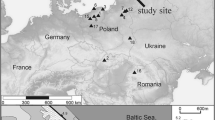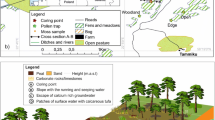Abstract
Many areas of blanket mire in Britain display apparently degraded vegetation, having a limited range of ericaceous and Sphagnum species. Data are presented here from Wales from the upland locality of Drygarn Fawr (Elenydd SSSI), which is dominated overwhelmingly by Molinia caerulea. Palaeoecological techniques were used to chronicle vegetation history and to determine the nature and timing of vegetation changes, as an aid to devising conservation management and restoration strategies. Although for the past 2000 years the pollen and plant macrofossil data indicate some evidence for cyclic vegetation change, they demonstrate that here the major vegetation change post-dated the start of the industrial revolution. The palaeoecological data show a greater proportion of Sphagnum than currently. Local extinction of some species (e.g., Myrica gale) apparently took place in Medieval times, but most of the degradation and floral impoverishment apparently occurred during the 20th Century. The implications for conservation management are far-reaching. The overwhelming dominance of Molinia is clearly unprecedented. While it was locally present for hundreds of years, some factor(s)—possibly a change in grazer and grazing regime—encouraged its recent ascendancy in the 20th Century. Consequently, any management attempts to reduce the pre-eminence of Molinia would not be countering an ingrained, long-established dominance. It is suggested that investigation of degraded blanket mires elsewhere by historical and multi-proxy palaeoecological techniques—through multiple, dated cores to track species extinctions and directional vegetation changes—would help ascertain previous mire floras and so indicate a range of restoration targets for mire vegetation.








Similar content being viewed by others
References
Aaby B (1976) Cyclic climatic variations in climate over the last 5,500 years reflected in raised bogs. Nature 263:281–284
Aaby B (1986) Palaeoecological studies of mires. In: Berglund BE (ed) Handbook of holocene palaeoecology and palaeohydrology. John Wiley, Chichester, pp 145–164
Aaby B, Tauber H (1975) Rates of peat formation in relation to degree of humification and local environment, as shown by studies of a raised bog in Denmark. Boreas 4:1–17
Andrus RE, Wagner DJ, Titus JE (1983) Vertical zonation of Sphagnum mosses along hummock-hollow gradients. Can J Bot 61:3128–3139
Barber KE (1976) History of vegetation. In: Chapman SB (ed) Methods in plant ecology. Blackwell, Oxford, pp 5–83
Barber KE, Chambers FM, Maddy D, Stoneman R, Brew JS (1994) A sensitive high resolution record of late Holocene climatic change from a raised bog in northern England. Holocene 4:198–205
Barber KE, Battarbee RW, Brooks SJ, Eglinton G, Haworth EY, Oldfield F, Stevenson AC, Thompson R, Appleby P, Austin WN, Cameron N, Ficken KJ, Golding P, Harkness DD, Holmes J, Hutchinson R, Lishman JP, Maddy D, Pinder L CV, Rose N, Stoneman R (1999) Proxy records of climate change in the UK over the last two millennia: documented change and sedimentary records from lakes and bogs. J Geol Soc London 156:369–380
Barber KE, Maddy D, Rose N, Stevenson AC, Stoneman RE, Thompson R (2000) Replicated proxy-climate signals over the last 2000 years from two distant UK peat bogs: new evidence for regional palaeoclimatic teleconnections. Quat Sci Rev 19:481–487
Berendse F, Schmitz M, de Visser W (1994) Experimental manipulation of succession in heathland ecosystems. Oecologia 100:38–44
Blackford JJ (1990) Blanket Mires and climate change: a palaeoecological study based on peat humification and microfossil analyses. Unpublished Ph.D. thesis, University of Keele
Blackford JJ (1993) Peat bogs as sources of proxy climate data: past approaches and future research. In: Chambers FM (ed) Climate change and human impact on the landscape. Chapman and Hall, London, pp 47–56
Blackford JJ, Chambers FM (1993) Determining the degree of peat decomposition in peat-based palaeoclimatic studies. Int Peat J 5:7–24
Burn AM (1981) Upland Vegetation Survey Site Report No. 3—Abergwesyn (Elenydd). Nature Conservancy Council, Bangor
Chambers FM (1982a) Two radiocarbon-dated pollen diagrams from high-altitude blanket peats in South Wales. J Ecol 70:445–459
Chambers FM (1982b) Environmental history of Cefn Gwernffrwd, near Rhandirmwyn, Mid-Wales. New Phytol 92:607–615
Chambers FM (1983) Three radiocarbon-dated pollen diagrams from upland peats north-west of Merthyr Tydfil, South Wales. J Ecol 71:475–487
Chambers FM, Mauquoy DM (1998) Recent human impacts on Welsh blanket bogs. Countryside Council for Wales Contract Science Report no. 301. CCW, Bangor
Chambers FM, Dresser PQ, Smith AG (1979) Radiocarbon dating evidence on the impact of atmospheric pollution on upland peats. Nature 282:829–831
Chambers FM, Mauquoy D, Todd PA (1999) Recent rise to dominance of Molinia caerulea in environmentally sensitive areas: new perspectives from palaeoecological data. J Appl Ecol 26:719–733
Clapham AR, Tutin TG, Moore DM (1987) Flora of the British Isles, 3rd edn. Cambridge University Press, Cambridge
Clark JS (1988) Particle motion and the theory of charcoal analysis: source area, transport, deposition and sampling. Quat Res 30:67–80
Clymo RS (1984) The limits to peat bog growth. Philos Trans R Soc Lond B 327:331–338
Coulson JC, Butterfield J (1978) An investigation of the biotic factors determining the rates of plant decomposition on blanket bog. J Ecol 51:443–459
Damblon F (1992) Palaeobotanical analysis of Eriophorum and Molinia tussocks as a means of reconstructing recent history of disturbed mires in the Haute-Ardenne, Belgium. Rev Palaeobot Palynol 75:273–288
Farragher MA (1974) Poaceae—Irish members. Part 5 Anatomy. Sci Proc R Dublin Soc Ser A 5:159–198
Grant SA, Torvell L, Common TG, Sim EM, Small JL (1996) Controlled grazing studies on Molinia grassland: effects of different seasonal patterns and levels of defoliation on Molinia growth and responses of swards to contolled grazing by cattle. J Appl Ecol 33:1267–1280
Griffin JJ, Goldberg ED (1981) Sphericity as a characteristic of solids from fossil fuel burning in a Lake Michigan sediment. Geochim Cosmochim Acta 45:763–769
Grimm E (1991) TILIA and TILIAGRAPH. Illinois State Museum, Illinois
Grosse-Braukmann G (1972) Über pflanzliche Makrofossilien mitteleuropaischer Torfe. I. Gewebereste krautiger Pflanzen und ihre Merkmale. Telma 2:19–55
Grosse-Braukmann G (1974) Über pflanzliche Makrofossilien mitteleuropaischer Torfe. II. Weitere Reste (Fruchte und Samen, Moose u. a.) und ihre Bestimmungsmoglichkeiten. Telma 4:51–117
Grosse-Braukmann G, Streitz B (1992) Über pflanzliche Makrofossilien mitteleuropaischer Torfe. III. Fruchte, Samen und einige Gewebe (Fotos von fossilen Pflanzenresten). Telma 22:53–102
Hansen K (1976) Ecological studies in Danish heath vegetation. Dansk Bot Arkiv 31:7–116
Heal OW, Diemont WM (1983) Raised nutrient levels change heathland into grassland. Vegetatio 53:113–120
Ingram HAP (1978) Soil layers in mires: function and terminology. J Soil Sci 219:224–227
Jones PS (2003) Blanket bog. In: Jones PS, Stevens DP, Blackstock TH, Burrows CR, Howe EA (eds) Priority habitats of Wales—a technical guide. Countryside Council for Wales, Bangor
Katz NJ, Katz SV, Skobeyeva EI (1977) Atlas of plant remains in peats (in Russian). Nauka, Moscow
Lageard JGA, Chambers FM, Grant ME (1994) Modified versions of a traditional peat cutting tool to improve field sampling of peat monoliths. Quat Newslett 74:10–15
MacDonald GM, Larsen CPS, Szeicz JM, Moser KA (1991) The reconstruction of Boreal Forest fire history from lake sediments: a comparison of pollen, sedimentological and geochemical indices. Quat Sci Rev 10:53–71
Marrs RH, Phillips JDP, Todd PA, Ghorbani J, Le Duc MG (2004) Control of Molinia caerulea on upland moors. J Appl Ecol 41:398–411
Moore PD, Webb JA, Collinson M (1991) Pollen analysis, 2nd edition. Blackwell Scientific, Oxford
Overbeck F (1947) Studien zur Hochmoorentwicklung in Niedesachsen und die Bestimmung der Humifiezierung bei stratigraphish-pollenanalytischen Moor untersuchungen. Planta Archiv für wissenschaftl. Botanik 35:Hft 1/2
Pitcairn CER, Fowler D, Grace J (1995) Deposition of fixed atmospheric nitrogen and foliar nitrogen content of bryophytes and Calluna vulgaris (L.) Hull. Environ Pollut 88:193–205
Preston CD, Pearman DA, Dines TD (eds) (2002) New atlas of the British and Irish Flora. Oxford University Press, Oxford
Renberg I, Wik M (1984) Dating of recent lake sediments by soot particle counting. Verh Int Verein Limnol 22:712–718
Renberg I, Wik M (1985) Carbonaceous particles in lake sediments—pollutants from fossil fuel combustion. Ambio 14:161–163
Rodwell JS, Pigott CD, Ratcliffe DA, Malloch AJC, Birks HJB, Proctor MCF, Shimwell DW, Huntley JP, Radford E, Wigginton MJ, Wilkins P (1991) British plant communities. Mires and heaths. Cambridge University Press, Cambridge
Rose NL (1990) A method for the extraction of carbonaceous particles from lake sediment. J Paleolimnol 3:45–53
Rose NL (1994) A note on further refinements to a procedure for the extraction of carbonaceous fly-ash particles from sediments. J Paleolimnol 11:201–204
Rose NL, Harlock S, Appleby PG, Battarbee RW (1995) Dating of recent lake sediments in the United Kingdom and Ireland using spheroidal carbonaceous particle (SCP) concentration profiles. Holocene 5:328–335
Rydin H, McDonald AJS (1985) Tolerance of Sphagnum to water level. J Bryol 13:571–578
Shaw SC, Wheeler BD, Kirby P, Phillipson P, Edmunds R (1996) Literature review of the historical effects of burning and grazing of blanket bog and upland wet heath. English Nature and Countryside Council for Wales, report no. 172, Peterborough
Smith AJE (1978) The moss flora of Britain and Ireland. Cambridge University Press, Cambridge
Stevenson AC, Thompson DBA (1993) Long-term changes in the extent of heather moorland in upland Britain and Ireland: palaeoecological evidence for the importance of grazing. Holocene 3:70–76
Stuiver M, Reimer PJ (1993) Extended 14C data base and revised CALIB 3.0 14C age calibration program. Radiocarbon 35:215–230
Tallis JH (1975) Tree remains in southern Pennine blanket peats. Nature 256:482–484
Tallis JH (1997) The Southern Pennine experience: an overview of blanket mire degradation. In: Tallis JR, Meade R, Hulme PD (eds) Blanket mire degradation: causes, consequences and challenges. Macaulay Land Use Research Institute (for BES), Aberdeen, pp 7–15
Tallis JR, Meade R, Hulme PD (eds) (1997) Blanket mire degradation: causes, consequences and challenges. Macaulay Land Use Research Institute (for BES), Aberdeen
Todd PA (1996) The MAFF Molinia study: control of purple moorgrass (Molinia caerulea (L.) Moench) in heather (Calluna vulgaris) moorland after reduction in sheep grazing. The Heather Trust Annual Report (1996), pp 13–16
UK Biodiversity Group (1999) UK Biodiversity Group, Tranche 2 Action Plans, vol. 6, terrestrial and freshwater species and habitats. English Nature, Peterborough
Watson L, Dallwitz MJ (1992) onwards. Grass genera of the world: descriptions, illustrations, identification, and information retrieval; including synonyms, morphology, anatomy, physiology, phytochemistry, cytology, classification, pathogens, world and local distribution, and references. http://biodiversity.uno.edu/delta/. Version: 18th August 1999
Wein RW, Burzynski MP, Sreenisva BA, Tolonen K (1987) Bog profile evidence of fire and vegetation dynamics since 3000 years BP in the Acadian Forest. Can J Bot 65:1180–1186
Yeo M (1997) Blanket mire degradation in Wales. In: Tallis JR, Meade R, Hulme PD (eds) Blanket mire degradation: causes, consequences and challenges. Macaulay Land Use Research Institute (for BES), Aberdeen, pp 101–115
Acknowledgements
Research was carried out under CCW contract number FC 73-01-172 ‘Recent human impact on Welsh Blanket bogs’, as a follow-up to a pilot study of the same name and contract number. We thank Chris Friend, for field and laboratory assistance; Charlotte Cook, for laboratory assistance; the National Trust and the Elan Trust for site access; and Marcus Yeo, for commissioning the work, and for field assistance and information on the field areas.
Author information
Authors and Affiliations
Corresponding author
Rights and permissions
About this article
Cite this article
Chambers, F.M., Mauquoy, D., Cloutman, E.W. et al. Recent vegetation history of Drygarn Fawr (Elenydd SSSI), Cambrian Mountains, Wales: implications for conservation management of degraded blanket mires. Biodivers Conserv 16, 2821–2846 (2007). https://doi.org/10.1007/s10531-007-9169-3
Received:
Accepted:
Published:
Issue Date:
DOI: https://doi.org/10.1007/s10531-007-9169-3




